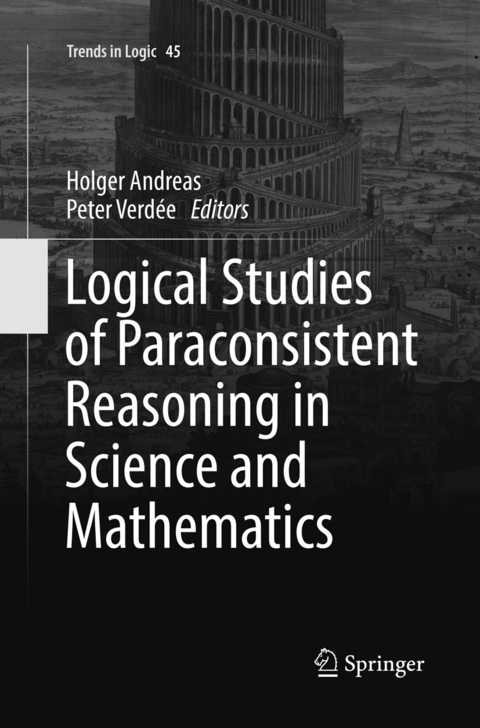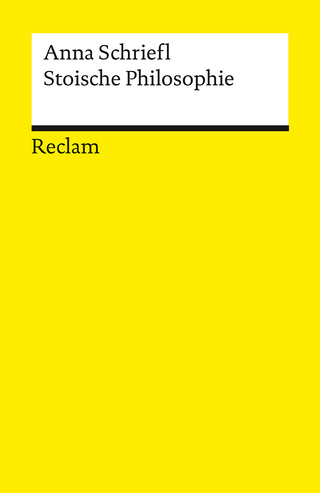
Logical Studies of Paraconsistent Reasoning in Science and Mathematics
Springer International Publishing (Verlag)
978-3-319-82056-9 (ISBN)
Holger Andreas works as Assistant Professor at the University of British Columbia, Okanagan Campus. Before that, he held non-tenure track Assistant Professorships at LMU Munich (Munich Center for Mathematical Philosophy) and the University of Bonn. His research focuses on the logical analysis of scientific reasoning and scientific theories. His recent work addresses interrelations between non-monotonic reasoning, belief changes, and paraconsistent reasoning. Peter Verdée is assistant professor at the Université catholique de Louvain. He obtained his PhD in Philosophy at Ghent University under the supervision of Diderik Batens with a dissertation on Adaptive Logic. His research focuses on non-monotonic, paraconsistent, and relevant logics, with particular interest in inconsistent mathematics and the formalization of implications and conditionals in natural language.
Chapter 1. Inconsistent Thinking, Fast and Slow; Francesco Berto.- Chapter 2. Recursive functions for paraconsistent reasoners; Zach Weber.- Chapter 3. Instantaneous Contradiction in Motion and Perception: Modeling the Phenomenal Present with a Dialetheic Logic of Time; Corry Shores.- Chapter 4. Saving Proof from Paradox: Against the Inconsistency of Informal Mathematics; Fenner Tanswell.-Chapter 5. Revenge for Berto's Law of Non-Contradiction; Diego Tajer.- Chapter 6. On Coherence and Inconsistency; Martin Pleitz.- Chapter 7. On the Preservation of Reliability; Bryson Brown.- Chapter 8. Inconsistency Handling in the Sciences: Where and How do we Need Paraconsistency?; Joke Meheus.- Chapter 9. Revision-Theoretic Truth and Degrees of Paradoxicality; Cian Chartier.- Chapter 10. Inconsistent Scientific Theories: A Framework; Otavio Bueno.- Chapter 11. Prospects for triviality; Luis Estrada Gonzáles.- Chapter 12. On the interpretation of classical mathematics in naïve set theory; Morgan Thomas.- Chapter 13. Doing Mathematics Paraconsistently. A manifesto.; Maarten McKubre-Jordens.- Chapter 14. Why designate gluts?; Andreas Kapsner.- Chapter 15. On the methodology of paraconsistent logic; Heinrich Wansing and Sergei Odintsov.- Chapter 16. Dynamic proofs for networks of partial structures; Holger Andres and Peter Verdée.
"Staging Trauma: Bodies in Shadow effectively interrogates the silencing or 'shadowing' of female experiences of trauma and abuse within public discourse and highlights the potentiality of the performance event in bringing marginalised bodies into light. ... This book offers a valuable provocation for students and scholars within the field of theatre and performance and provides a thorough introduction to contemporary trauma discourse." (Karoline Moen, Studies in Theatre and Performance, December, 2018)
“Staging Trauma: Bodies in Shadow effectively interrogates the silencing or ‘shadowing’ of female experiences of trauma and abuse within public discourse and highlights the potentiality of the performance event in bringing marginalised bodies into light. … This book offers a valuable provocation for students and scholars within the field of theatre and performance and provides a thorough introduction to contemporary trauma discourse.” (Karoline Moen, Studies in Theatre and Performance, December, 2018)
| Erscheinungsdatum | 05.03.2022 |
|---|---|
| Reihe/Serie | Trends in Logic |
| Zusatzinfo | VI, 221 p. 5 illus. |
| Verlagsort | Cham |
| Sprache | englisch |
| Maße | 155 x 235 mm |
| Gewicht | 355 g |
| Themenwelt | Geisteswissenschaften ► Philosophie ► Allgemeines / Lexika |
| Geisteswissenschaften ► Philosophie ► Logik | |
| Mathematik / Informatik ► Mathematik ► Allgemeines / Lexika | |
| Mathematik / Informatik ► Mathematik ► Logik / Mengenlehre | |
| Schlagworte | Inconsistent Theories • mathematical reasoning • Naïve Set Theory • paraconsistent logic • Scientific reasoning • Tarskian truth scheme |
| ISBN-10 | 3-319-82056-7 / 3319820567 |
| ISBN-13 | 978-3-319-82056-9 / 9783319820569 |
| Zustand | Neuware |
| Informationen gemäß Produktsicherheitsverordnung (GPSR) | |
| Haben Sie eine Frage zum Produkt? |
aus dem Bereich


